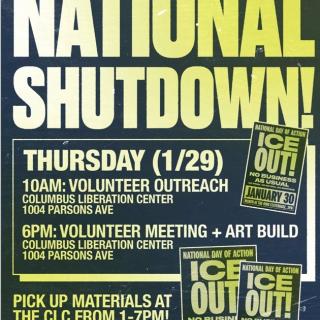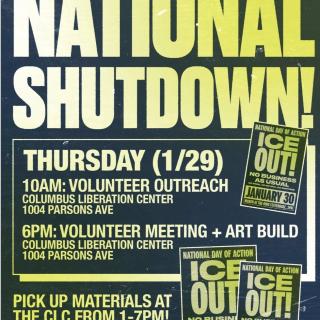In the opinion of our highly respected City Auditor Megan Kilgore regarding the impact COVID-19 will have on Columbus’s economy, Ms. Kilgore states, “The likely scenarios are not good and will require federal, state, and local stimulation to rebuild businesses’ balance sheets and turn things around for our most vulnerable workers.”
Since March 3, when nearly the entire Arnold Sports Festival was shut down, our Mayor and City Council has taken steps to mitigate the spread of the virus.
They have temporarily halted all city meetings, closed recreation and senior centers, passed a $1 million emergency human services fund, created an additional $12,000 senior citizens relief fund, established a COVID-19 Resource web site, ordered city employee travel restrictions, relaxed various street parking violations, and suspended parking ticket fines and penalties.
Mayor Ginther has also signed a declaration of a State of Emergency for Columbus granting him emergency powers to suspend certain city codes and regulations, and to control purchasing and contracting requirements to assure the public’s health and safety.
He has directed about 1,300 full time city employees to remain at home while roughly 7,500 city workers continue to stay on the job. All full-time city employees will continue to be paid and part-time employees will be paid for the hours they work.
I commend Ginther and City Council for justly focusing on the public health and wellbeing of our must vulnerable citizens.
But how will they address the undeniable loss of city tax dollars and its impact on all of Columbus must be considered?
Our approved 2020 projected general operating fund of $923,733,000 will be impossible to reach.
The loss of city income tax dollars (76% of our General Fund) has been snowballing ever since the March 3rd scale down of the Arnold Festival, which would have generated about $53 million for the Columbus economy.
Half of the city’s income tax revenue come from our areas 100 largest employers. The top 10 includes OSU, Ohio Health, Wal-Mart, State of Ohio, JP Morgan Chase, Nationwide Insurance, Nationwide Children’s, Kroger, City of Columbus and Mount Carmel.
These companies employ about 18% of the greater Columbus workforce and should remain fairly stable during the pandemic.
However, small and medium sized businesses employee 50% plus percentage of Columbus workers and have taken a sudden punch to the gut. They will suffer even longer-term economic instability.
Decisions need to be made on where city dollars should be cut, and other cost savings will depend on how long restrictions remain in place. But for hundreds-of-thousands of Columbus citizens, recovering from this crisis will take a long time, regardless if it ends in the next two-three months.
Before considering dipping into our $80.6 million rainy day fund, other cuts need to be weighed:
- The city’s $50 million commitment to refurbish Mapfre Stadium should be put on hold indefinitely. This part of the Crew deal was a gift to the Haslam’s in the first place. The Crew can continue to use its current practice facility in Obetz. The health and economic well-being of human lives is more important than soccer fields and some basketball courts.
- Our city’s third highest generator of revenue which goes towards our operating fund, comes from property taxes. Columbus citizens have grown increasingly doubtful of the Mayor and City Council’s continuous excuses as to why tax abatements and city income tax incentives are needed to maintain and expand economic development. Now more than ever, property and city income tax breaks need to stop. Developers and large corporations have been living off the gravy train and getting fat long enough. The working families and people of this city need every penny of assistance our local government can provide. And while Democrats in Congress fight to make sure the federal stimulus package helps workers and small businesses first, City Hall must do the same and not prioritize campaign contributors over families and individual’s livelihoods.
- While only into the third month of our city’s 2020 Operating Budget, a complete re-examination of expenditures and each department’s proposed budgets is needed. A hiring freeze must be put into place. If city employees’ jobs are impacted to the degree their duties are no longer required to provide city services, the unpopular decision and anguish of laying off employees should occur. Layoffs need to be made from the top down. As a construction worker, I can attest to standing in unemployment lines for hours waiting to file for unemployment benefits back in the day. Construction workers know work slowdowns are inevitable and prepare for them. Department heads need to look hard at where savings can be made and make tough decisions while doing what is in the best interest of the city and its people.
I am optimistic we will get through this crisis. But City Hall cannot continue business as usual. The issues of affordable housing, economic disparity, healthcare, providing living wages, infant mortality, homelessness, lack of democracy, and educational needs will remain with us after this pandemic is no longer.
Once this crisis is in hand, it will provide an opportunity to bring substantive changes to this city that the people of Columbus have been hungering for.
Don’t give up the fight!



